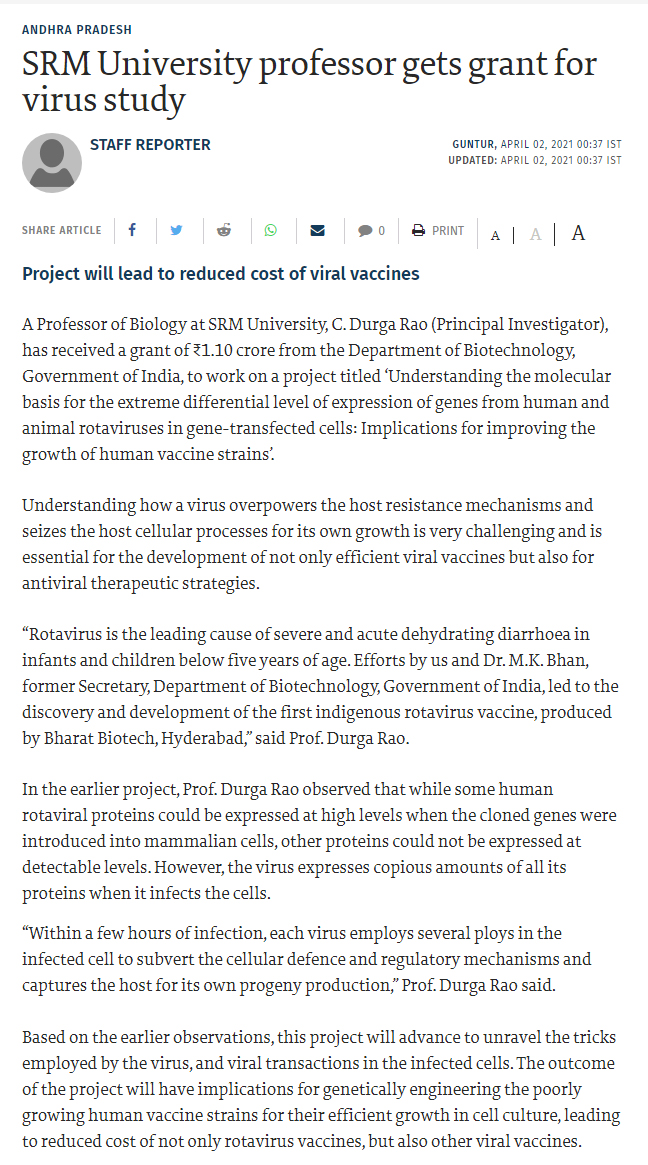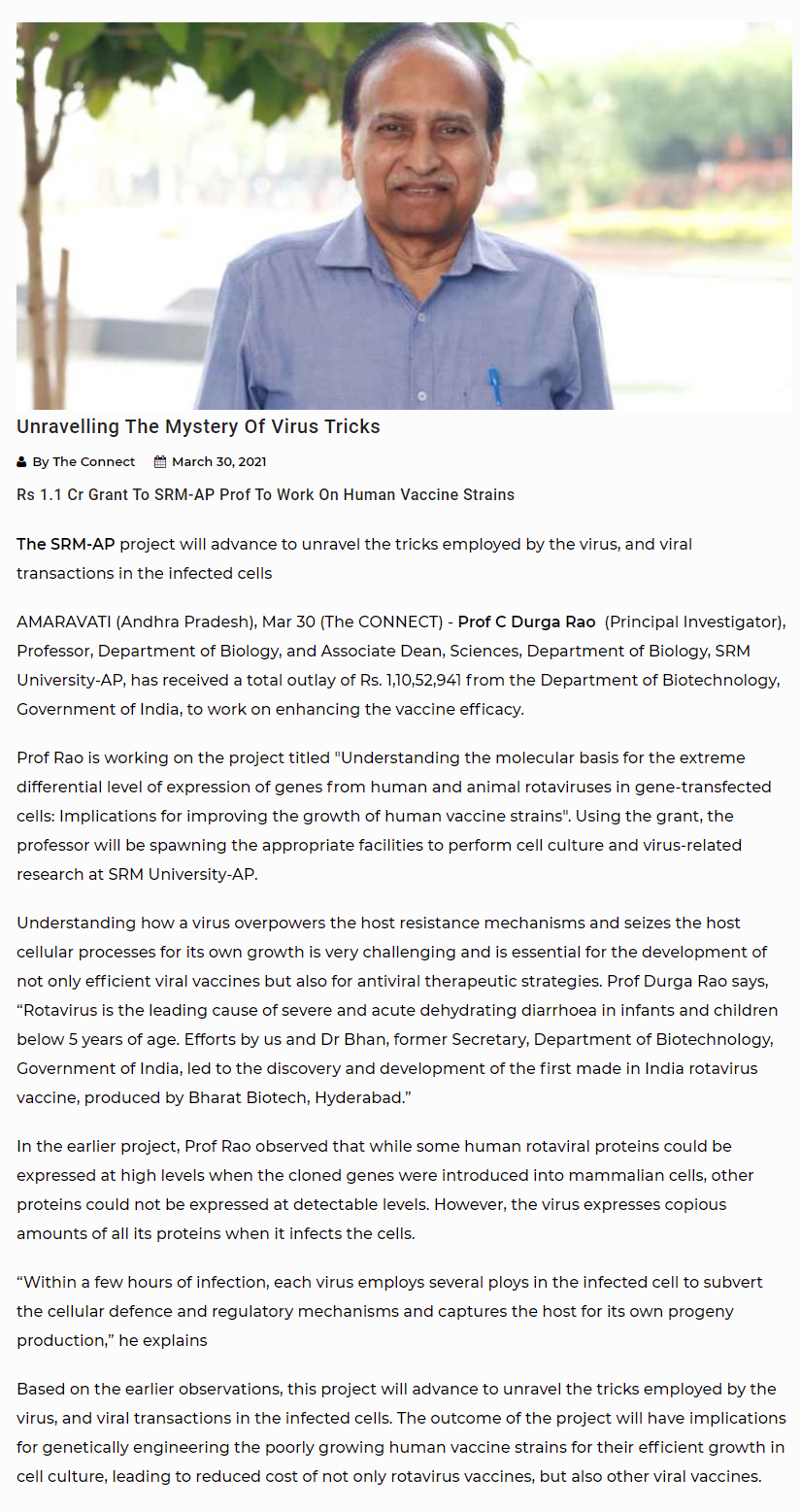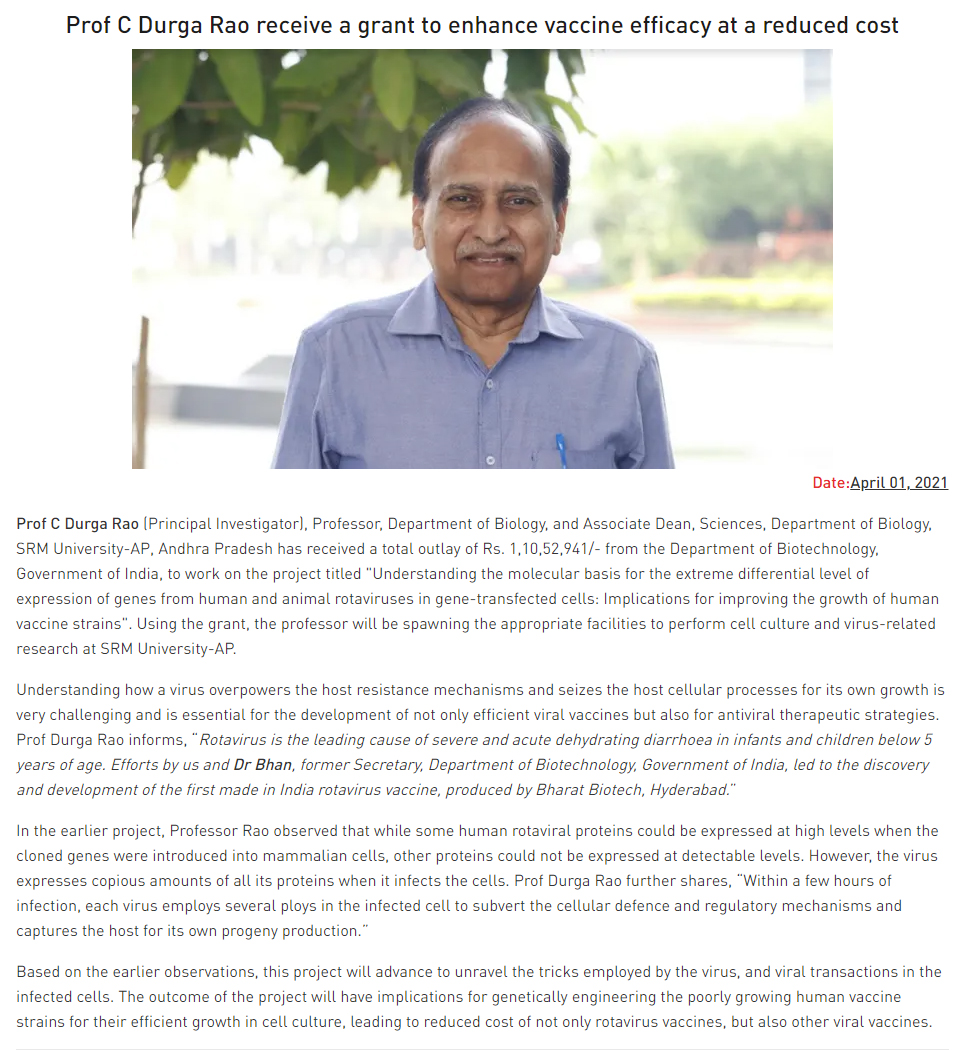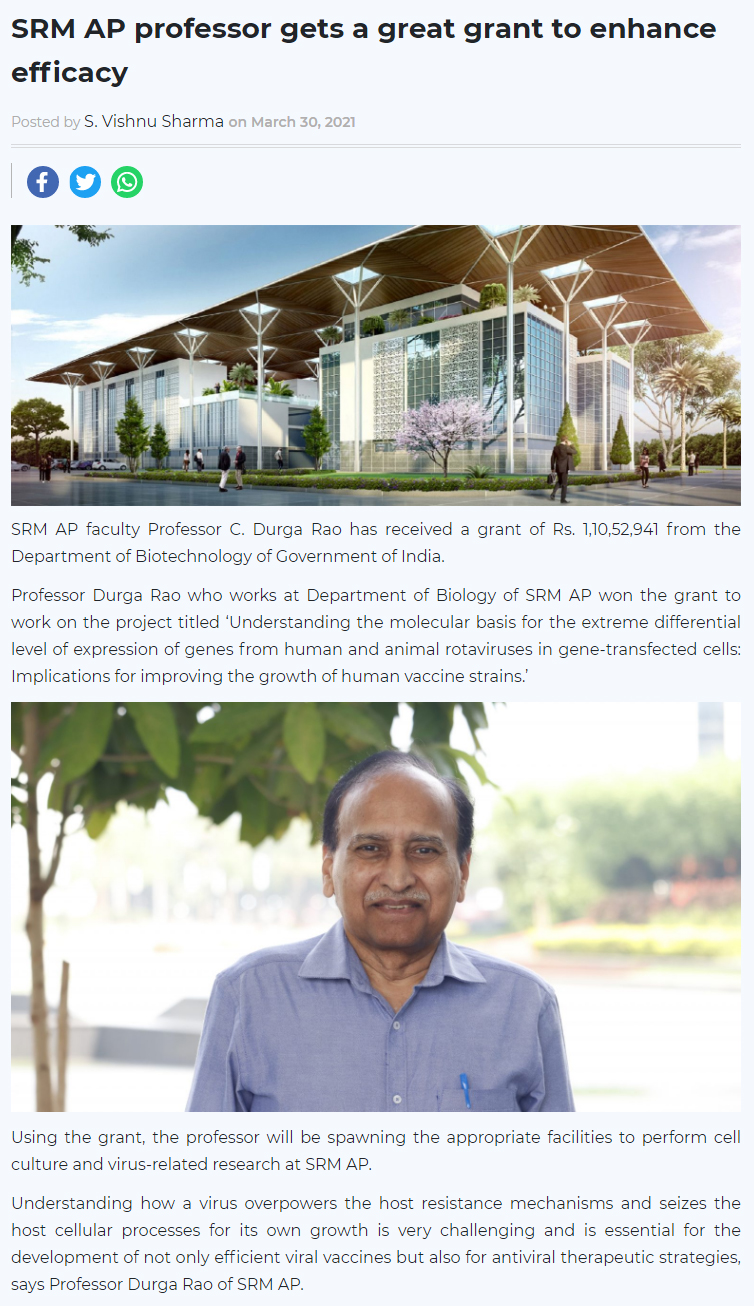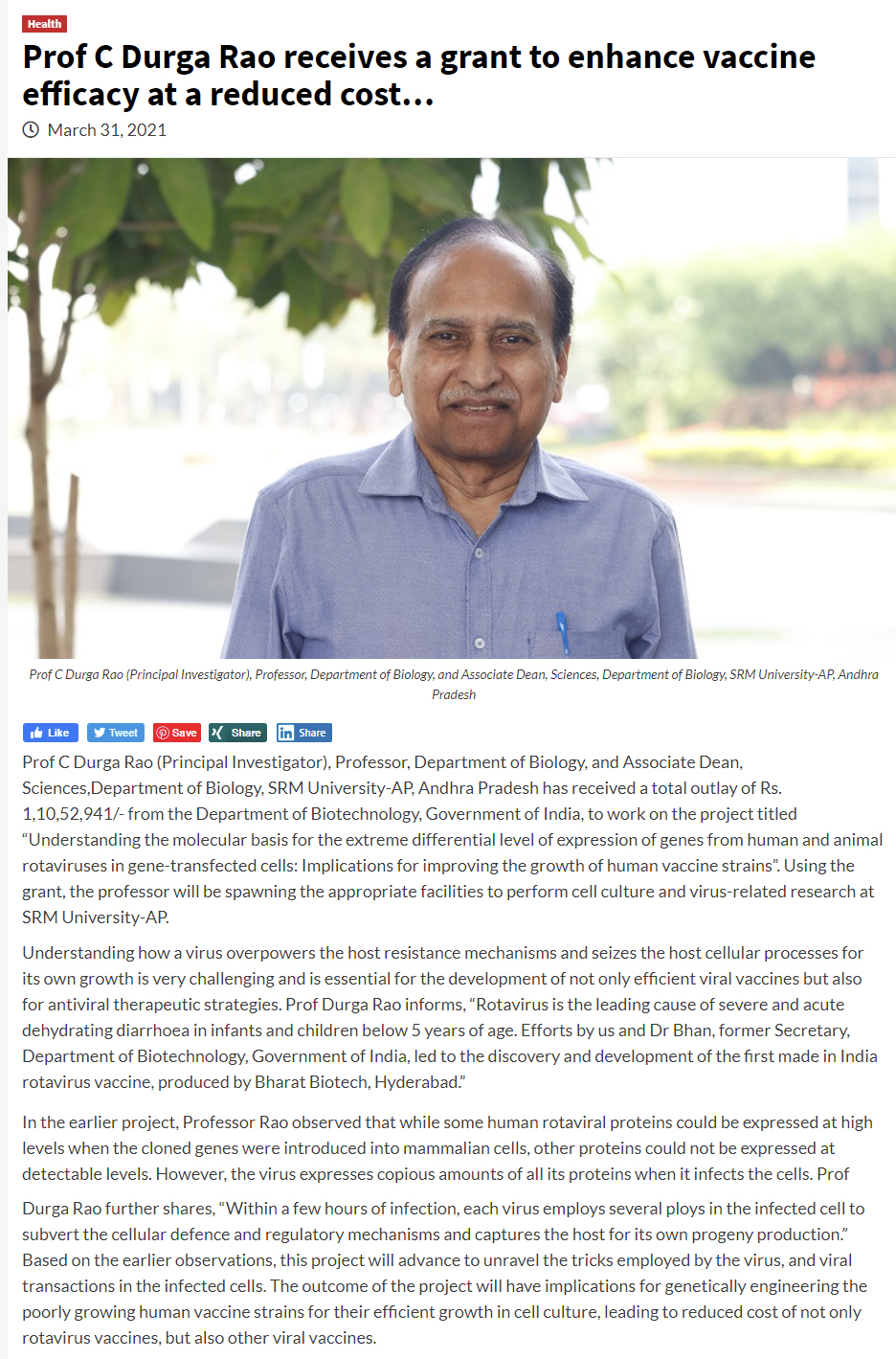All Management Events
- Careers in Nanomaterials April 5, 2021
What are Nanomaterials?
Nanomaterials are substances or materials that are manufactured and used at a, as the name suggests, very small scale. ISO (2015) defines a nanomaterial as a ‘material with any external dimension in the nanoscale (size range from approximately 1 – 100 nm) or having internal structure or surface structure in the nanoscale’.
Insert video: https://www.youtube.com/watch?v=DAOFpgocfrg
Why are they important?
Nanomaterials are the most recent and most exciting development in materials science. Nanoscale materials have unique optical, electronic, or mechanical properties. Thus, when compared to the same material which is not at a nanoscale, they show more optimal performance measured typically in strength, chemical reactivity or conductivity.
What are the industry applications of nanomaterials?
The scope, unlike the size of nanomaterials, is massive:
-
Better building insulation,
-
More energy efficiency,
-
Better batteries,
-
Better cosmetics,
-
Nimble automobiles, aircraft, ships, spacecraft
…..there is nothing nano about the potential for nanomaterials and nanotechnology. There is every possibility that this field will touch just about every industry that exists today and will even create new and unthought of applications.
Insert video: https://www.youtube.com/watch?v=fY0E4xRyfek
Who is the field relevant for?
Considering that we have only just begun to understand the scope of development and application of nanomaterials, the future for this field is bright.
The kind of backgrounds required for this field could include:
-
Engineers,
-
Material Scientists, and
-
Physics, Chemistry, and Biology graduates.
However, nanoscience is essentially interdisciplinary wherein science is applied to engineering and hence a holistic mindset/approach is needed.
What are the career prospects?
As mentioned, the industries requiring this expertise are extremely diverse. Currently, nanomaterials have seen significant adoption in sectors like:
-
Electronics,
-
Textiles,
-
Polymers,
-
Packaging,
-
Transportation,
-
Sporting goods,
-
Computing,
-
Medical equipment,
-
Forensics,
-
Military, and
-
Energy, among others.
According to the widely followed recruiter.com, salaries in the USA range between $45,000 and $73,000 for nanotechnology engineering technicians. Needless to say, as use of nanomaterials expands engineers with significant experience can see their salaries grow significantly in the coming years, more so since demand will outstrip supply of candidates.
How do I get started?
The pathway starts from an undergraduate degree in engineering or sciences with a focus on specific courses in nanotechnology, nanomaterial, or nanoscience. Alternatively, with the growth of nanoscience in India several universities including SRM AP offer undergrad and masters courses with specialisation in nanotechnology. This can be coupled with the many options available at the PhD level in this exciting field.
Continue reading → -
- Engineering Physics: Great Career Choices April 5, 2021
What it is
Engineering Physics refers to the combined disciplines of physics, mathematics, and engineering. The field seeks ways to apply, design, and develop new solutions in engineering and holds promising career prospects for interested graduates of science or engineering.
One of the biggest advantages of Engineering Physics is that unlike traditional engineering or science disciplines, it does not restrict itself to one domain. The focus is on applied physics covering highly specialised fields such as quantum physics, materials science, applied mechanics, electronics, nanotechnology, microfabrication, microelectronics, computing, photonics, nuclear engineering, biophysics, control theory, aerodynamics, energy, solid-state physics, and others.
The focus on coming up with integrated solutions sourced from multiple specialities ensures that the solutions thus derived are more optimal, effective, and efficient. The cross-functionality also serves as a bridge for the long-standing gap between the theoretical and practical sides of science and engineering.
Who is it for
As stated, graduates of science or engineering can look to specialise in Engineering Physics. Scientists looking to move beyond theory, or engineers looking to create real solutions to tangible problems using theoretical rigour find this field exciting.
Career prospects
Qualified engineering physicists fit in into opportunities within high technology industries some of which are in emergent domains. Broadly speaking, the roles span research and development, design, and analysis. The industry will depend on the engineering specialisation that is selected, i.e. mechanical, computer, nuclear, aerospace, etc.
Engineering Physics is well poised to grow as a segment specifically because of the many emergent sectors in which it has application as well as the technological progress in the last decade that has created entirely new industries. Some of the key areas that will see job growth are discussed below.Agro Physics
The pressures of a growing global population and the need for sustainable agriculture are going to [belatedly] lead to science and engineering playing a larger role in how we grow crops. Agro Physics is an evolving field and it involves the study of materials and processes in the sowing, harvesting, and processing of agricultural produce.
Artificial Intelligence
Artificial Intelligence or AI refers to machines that mimic human cognitive functions such as learning and problem solving. This exciting field is growing by leaps and bounds and holds great promise in automation of many processes besides an exponential growth in processing capacities.
Biomechanics
Biomechanics involves the study of the structure, function and motion of the mechanical aspects of living systems. The field touches applications such as aerodynamics, orthopedics, locomotion, pathology, oncology, among others.
Bionanotechnology
Bionanotechnology refers to the combination of nanotechnology and biology. Here, bio systems within nature are used as inspiration for creating new nanodevices or nanoparticles. Nanomedicine is the obvious field that is looking to benefit from the progress made in Bionanotechnology, while agriculture is another sector that will see application of new solutions.
Composite materials
A composite material is made from two or more constituent materials with significantly different physical or chemical properties that, when combined, produce a material with characteristics different from the individual components. The objective could be to make the composite lighter, stronger, harder, softer, resistant, flexible, rigid, etc. While composite materials have existed since ages (concrete and steel are composite materials!), limits in development of new materials are constantly being pushed through progress in Engineering Physics.
Machine learning (ML)
ML is a subset of AI and refers to algorithms and statistical models that computer systems use to perform a task without any instructions input by human operators, relying on patterns and inference instead. ML is beginning to find application across many sectors including primarily Economics, Finance, Forensics, Medicine, Search Engines, etc.
Microfabrication
Miniaturisation of various devices (think about the first cell phones and compare them with devices today) has led to the need for Microfabrication, which is the process of fabricating miniature structures of micrometre scales and smaller. Progress in material science, nanotechnology, and other fields has led to growth in possibilities in this field.
Nanotechnology
Nanotechnology is the manipulation of matter on an atomic, molecular, and supramolecular scale. Apart from medicine, Nanotechnology holds immense potential for multiple industrial sectors such as defence, textiles, food packaging, sports, construction, and energy. The fruits of the research conducted in this exciting field over the years is only just beginning to be realised.
Neural engineering
The human neural system is an extremely complex arrangement linking the brain with the rest of the body. Neuroscience is still making tentative progress in understanding how this system works and this pace has quickened lately thanks to the improvement in imaging systems. Neural engineering is a discipline within bioengineering that uses engineering to understand, repair, replace, or enhance these complex neural systems. Aspects such as Neuroimaging, Neuromechanics, Neuromodulation, Neurorobotics, and Neuroregeneration hold great promise for patients who have been resigned to living with neurological disorders.
Robotics
Robotics is the true combination of Computer, Electronics and Mechanical Engineering with Physics. While Robots have existed since many decades now, the application across more sectors, the sophistication of the robotic systems, and their efficiency are being enhanced through the many technological developments. This will lead to productivity and efficiency gains across multiple sectors.
Continue reading → - The 5 aspects to look for in a business course to be future ready April 5, 2021
Learning business management is a complicated enough exercise with experts divided on whether management is science or art, or both. In the current era, the complications are compounded by the pace of change. Theories and frameworks are getting outdated rapidly and textbooks can be obsolete by the time they reach the student’s desk from the printer. In this scenario, how does a student ensure that the business studies course is keeping him or her future ready? The answer is not easy given the situation, but there are 5 universal aspects that few would dispute.
1. Practical experience
Many business studies courses are geared towards freshers with limited to no work experience. If the course itself offers no avenues for practical experience then the student graduates with a skill handicap. Look for courses that offer hands-on business experience during studies. This can be in the form of industrial projects from real companies, internships, assistance on faculty research projects for companies, or even simple opportunities for interaction with the real business world. Being in actual situations, facing real problems of real people shapes your world view and the sooner you can gain this experience the better. For this, look for institutions that have tie-ups for such opportunities with their recruiters and other corporates.
2. Soft skills
Many business studies courses are geared towards freshers with limited to no work experience. If the course itself offers no avenues for practical experience then the student graduates with a skill handicap. Look for courses that offer hands-on business experience during studies. This can be in the form of industrial projects from real companies, internships, assistance on faculty research projects for companies, or even simple opportunities for interaction with the real business world. Being in actual situations, facing real problems of real people shapes your world view and the sooner you can gain this experience the better. For this, look for institutions that have tie-ups for such opportunities with their recruiters and other corporates.
3. People matter
In a networked and ever-changing business world, no one can function in a silo. Effective team work is essential in an era where multiple perspectives are needed to solve complex problems. And this means people need to be effective at working together. Empathy, accommodation, appreciating diversity, understanding and working with differences, and sensitivity are the key skills that need to be developed for success and these are timeless skills. Institutes that build in team work and people dependencies into course work will help groom managers who can work effectively and efficiently with any group of co-workers. This is why many courses involve a large volume of team assignments, presentations, and projects.
4. Global perspective
Globalisation is a reality that no business, big or small, can ignore and this will only compound in the future as trade and people mobility go up in future. Even an entry level business manager needs to be cognisant, aware, and prepared to work in a complex and interlinked world. How do you achieve this when many entry level managers have not even stepped out of their city of birth? Developing the ability to work with different nationalities, being comfortable in foreign environments, and being able to blend into the unfamiliar are going to be must have skills for the future and preparation needs to begin early. Courses that offer foreign language courses, cross-cultural collaboration opportunities, international exchange programs, diverse pool of international students, and opportunities to learn from foreign visiting faculty are one way to prepare for this business reality.
5. An entrepreneurial approach
Some theoretical concepts are timeless while other whither away. However new approaches to solving old problems and developing abilities to deal with new problems are always evolving. After all, many of the challenges and opportunities seen today did not exist even 5 years ago. How would a graduate from then cope today and how will he/she cope tomorrow? The dynamism needed to face unique situations and problems comes from developing an entrepreneurial mindset in students from an early stage. This mindset can be developed through a pedagogy that focuses on doing, experimenting, failing, learning, unlearning, and taking responsibility for one’s efforts. Courses that spoon feed will soon disappear into the sands of time, as will the students who learned with such approaches.
Bear in mind that there is no course which will teach you all the skills you will need in the future. A course can provide you with timeless skills, some of which are listed above, and it can provide you with a mindset of flexibility, entrepreneurship, ownership, responsibility, and risk taking. If you have these then your skill set is indeed timeless.
Continue reading → - Faculty members of SRM University-AP awarded separate research grants by the National Supercomputing Mission (NSM), Government of India April 5, 2021
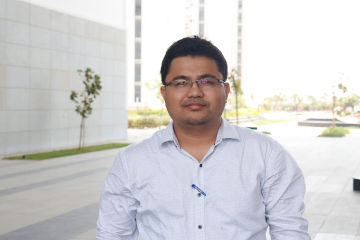 Prof Ranjit Thapa, Professor, Department of Physics, SRM University – AP, Andhra Pradesh has been awarded a first-year grant of Rs 28 Lakhs by the National Supercomputing Mission (NSM), supported by the Department of Science and Technology (DST) in collaboration with the Ministry of Electronics and Information Technology (MeITy), Government of India. Prof Ranjit will be working on the project titled “Catalysts for CO2 Reduction to C2 Product: Descriptor to Database” as the project leader. He has started the work to search for the best catalyst to convert CO2 into useful product and hence solving the problem of climate change due to large production of CO2 through different sources.
Prof Ranjit Thapa, Professor, Department of Physics, SRM University – AP, Andhra Pradesh has been awarded a first-year grant of Rs 28 Lakhs by the National Supercomputing Mission (NSM), supported by the Department of Science and Technology (DST) in collaboration with the Ministry of Electronics and Information Technology (MeITy), Government of India. Prof Ranjit will be working on the project titled “Catalysts for CO2 Reduction to C2 Product: Descriptor to Database” as the project leader. He has started the work to search for the best catalyst to convert CO2 into useful product and hence solving the problem of climate change due to large production of CO2 through different sources.CO2 is a known greenhouse gas and key reason for global warming and climate change. Can we challenge mother nature by converting CO2, a greenhouse gas into energy with the required efficiency? This is a mystery and a mammoth problem and a much-needed problem to be solved with a fundamental approach. Prof Ranjit Thapa believes that metal nanocatalyst on support materials can solve the problem and can increase the efficiency of CO2 reduction to C2 products, viz., ethylene (C2H4) and ethanol (C2H5OH). An experimental approach to find the best catalyst for CO2 reduction needs enormous funds and trials, and a long time is required to develop the exact catalyst for industry application. The mammoth task is to find the suitable composition, shape, and size of metal nanoparticle (MNP) on an appropriate surface for the catalytic reactions. Prof. Ranjit proposes that this can be achieved by computational modelling using Density Functional Theory (DFT) through finding and estimating the electronic descriptor and revealing active sites through structure-activity relations. Recent progress in Machine Learning (ML) for materials with DFT modelling drives towards rational design of catalysts. The electronic descriptor, storage of MNP/support information in the database followed by prediction using Machine Learning (using predictive model equation) will help to narrow down the search for the best catalyst for CO2 reduction to C2 species.
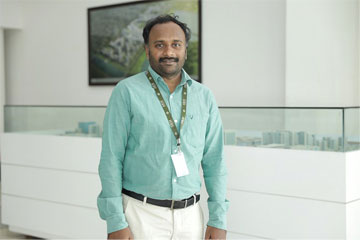 Further, Dr Mahesh Kumar Ravva, Assistant Professor, Department of Chemistry, SRM University – AP, Andhra Pradesh received Rs 19.92 Lakhs as the first instalment from DST-National Supercomputing Mission (NSM). His project’s primary focus will be on understanding the critical factors that influence the performance of organic solar cells. Using the supercomputer, his research group will model the electronic process that occurs during solar cell operation. The outcome of this project will guide experimentalists to develop organic solar cells with higher efficiency. Organic solar cells are flexible, lightweight, and low-cost and have many exciting applications in wearable electronic devices, smart windows, etc.
Further, Dr Mahesh Kumar Ravva, Assistant Professor, Department of Chemistry, SRM University – AP, Andhra Pradesh received Rs 19.92 Lakhs as the first instalment from DST-National Supercomputing Mission (NSM). His project’s primary focus will be on understanding the critical factors that influence the performance of organic solar cells. Using the supercomputer, his research group will model the electronic process that occurs during solar cell operation. The outcome of this project will guide experimentalists to develop organic solar cells with higher efficiency. Organic solar cells are flexible, lightweight, and low-cost and have many exciting applications in wearable electronic devices, smart windows, etc.Prof V S Rao, Vice-Chancellor, SRM University – AP, and Prof D Narayana Rao, Pro Vice-Chancellor, SRM University – AP congratulated Prof Ranjit Thapa and Dr Mahesh Kumar Ravva. Prof Narayana Rao said, “Necessary facilities and support will be provided by the University to effectively carry out the two projects.”
Continue reading → - Dr M Ramakrishnan April 4, 2021
- Prof C Durga Rao Receive A Grant To Enhance Vaccine Efficacy At A Reduced Cost April 4, 2021
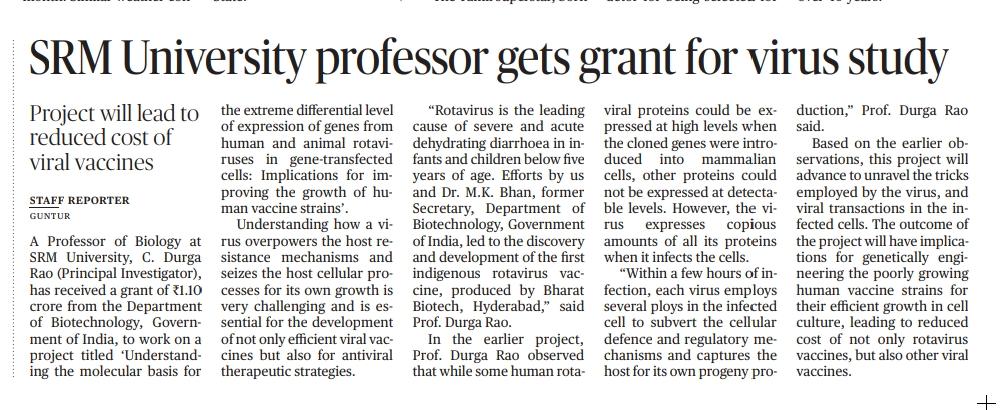
Financial Express – April 03
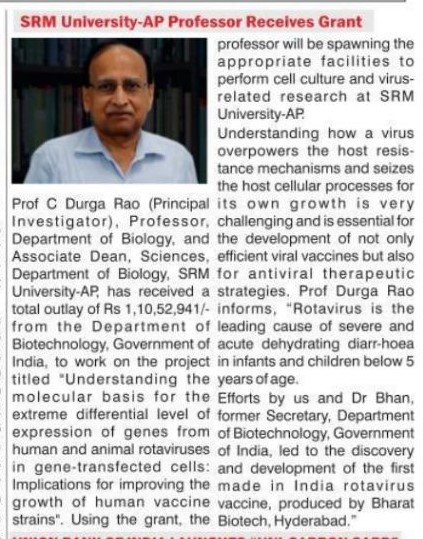
Daily Pioneer – March 31
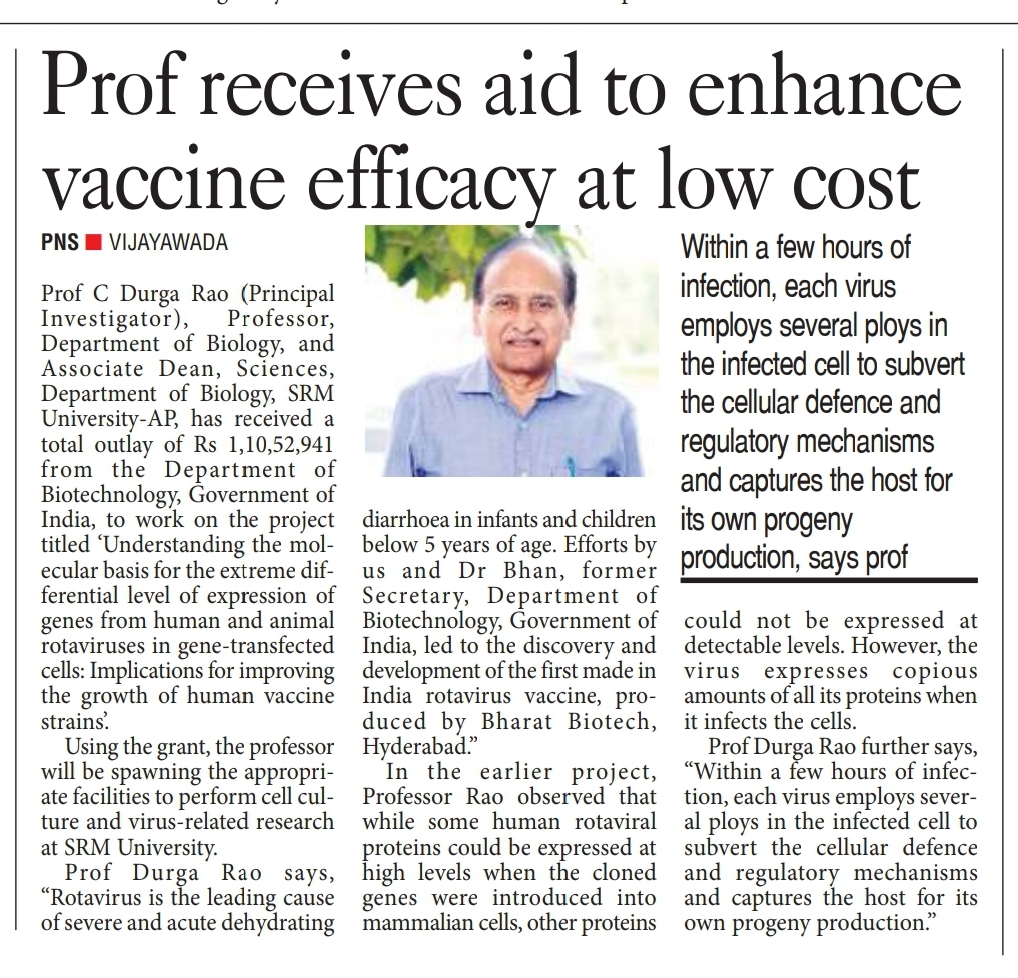
The Hans India – March 28
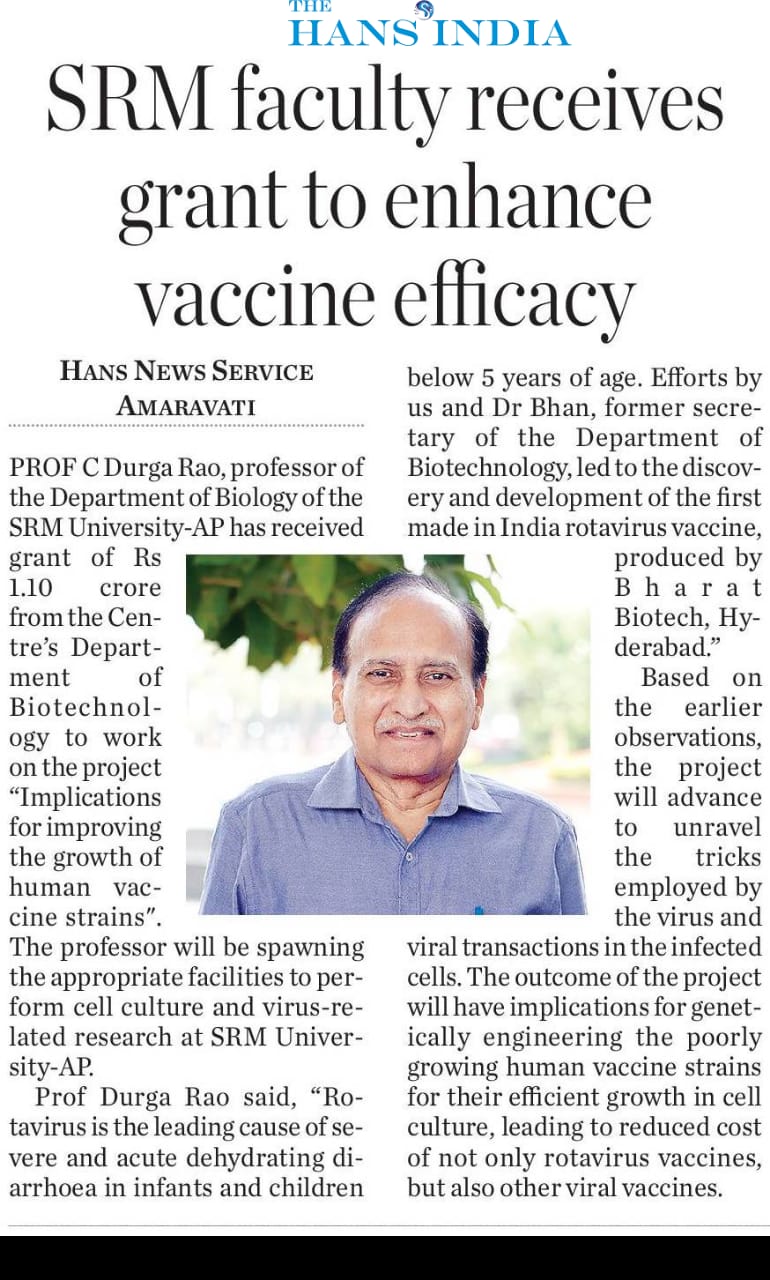
Business News This Week – March 31
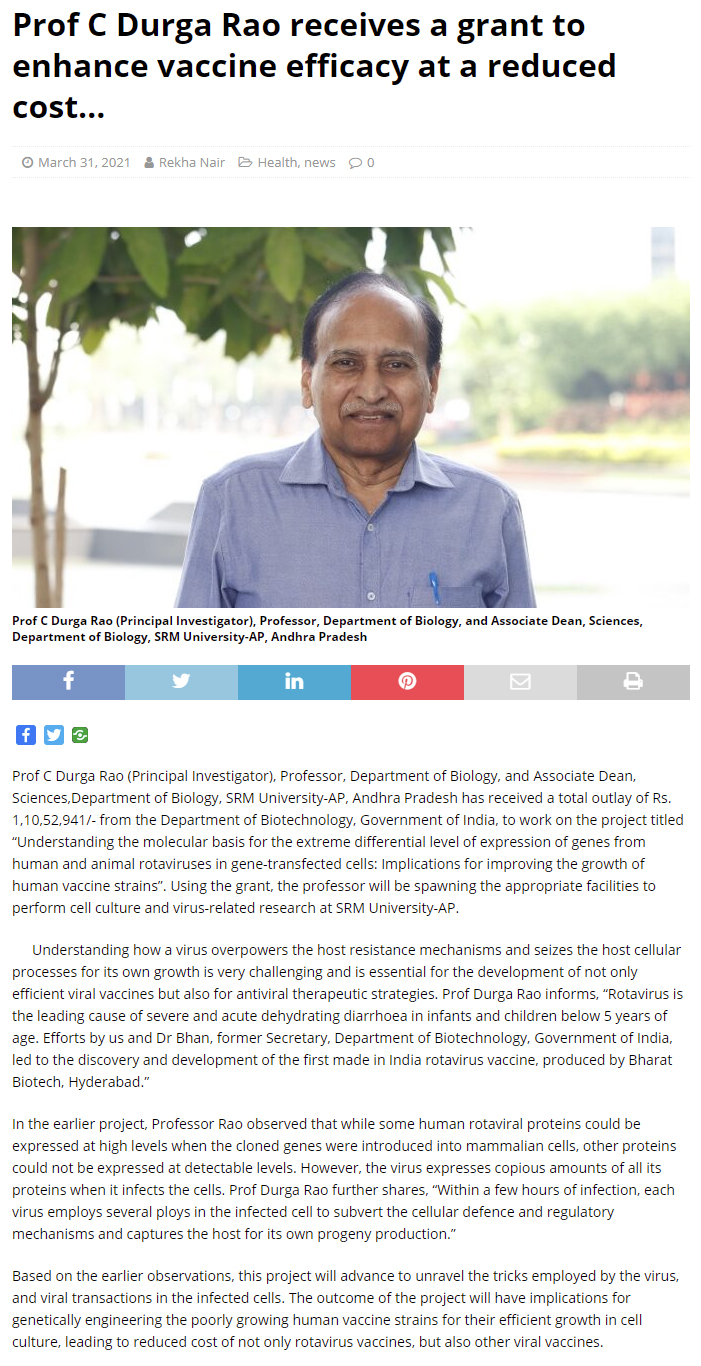
Higher Education Digest – March 30
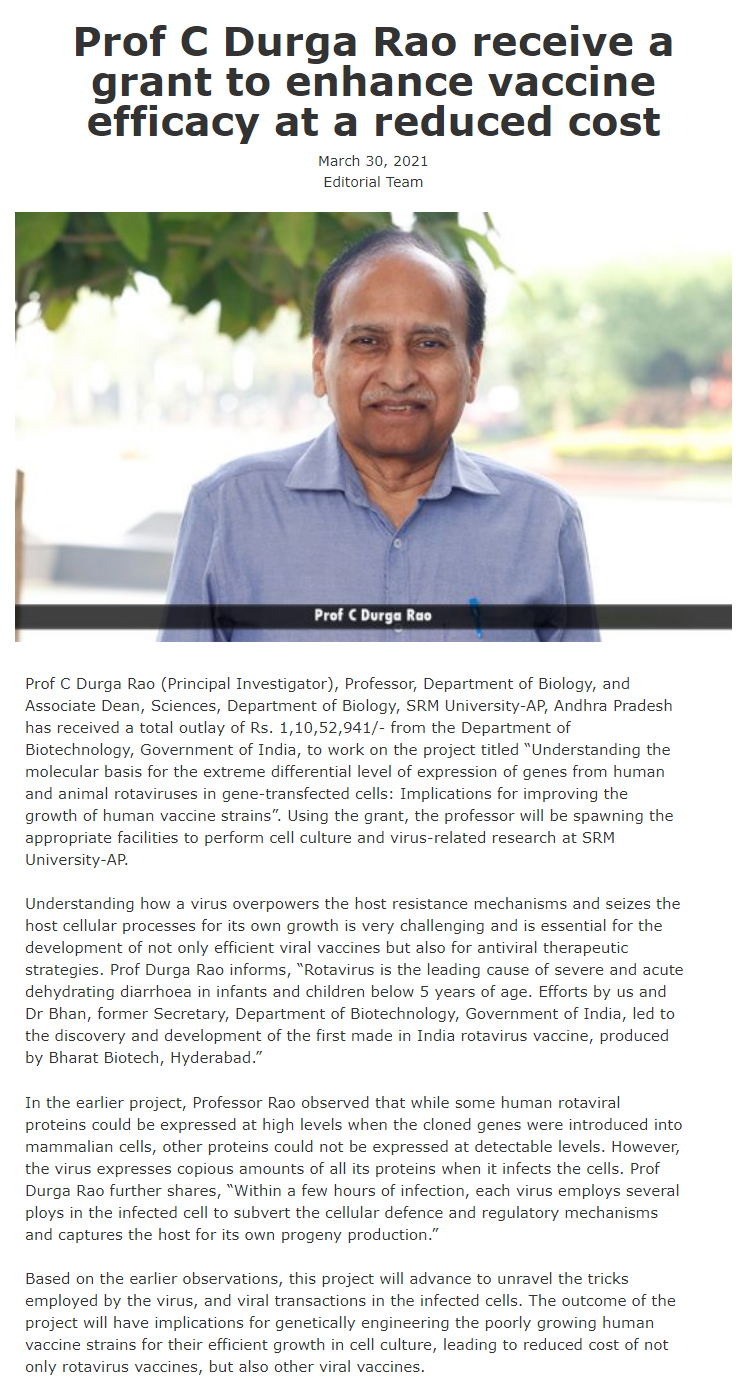
India Education Diary – March 30
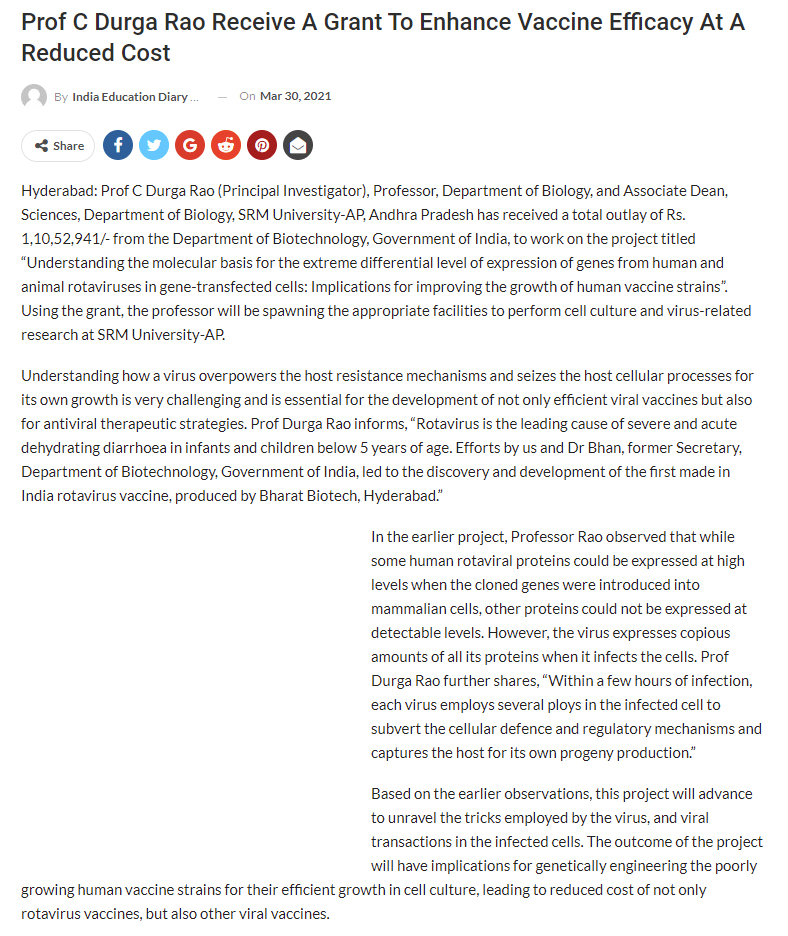
United News of India – March 30
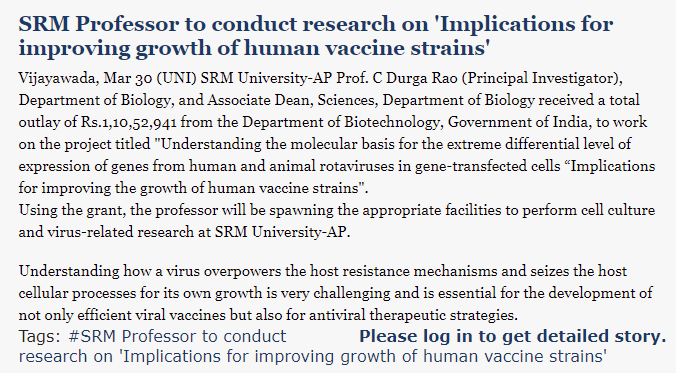
Eenadu – March 31
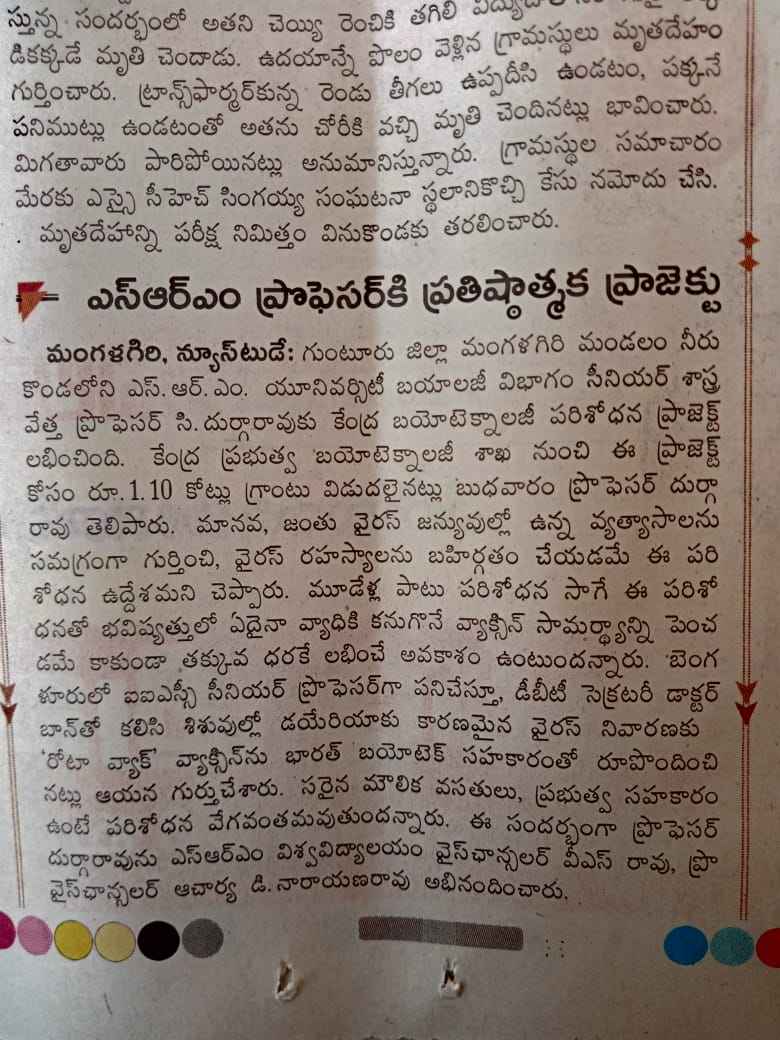
Andhra Prabha – March 31
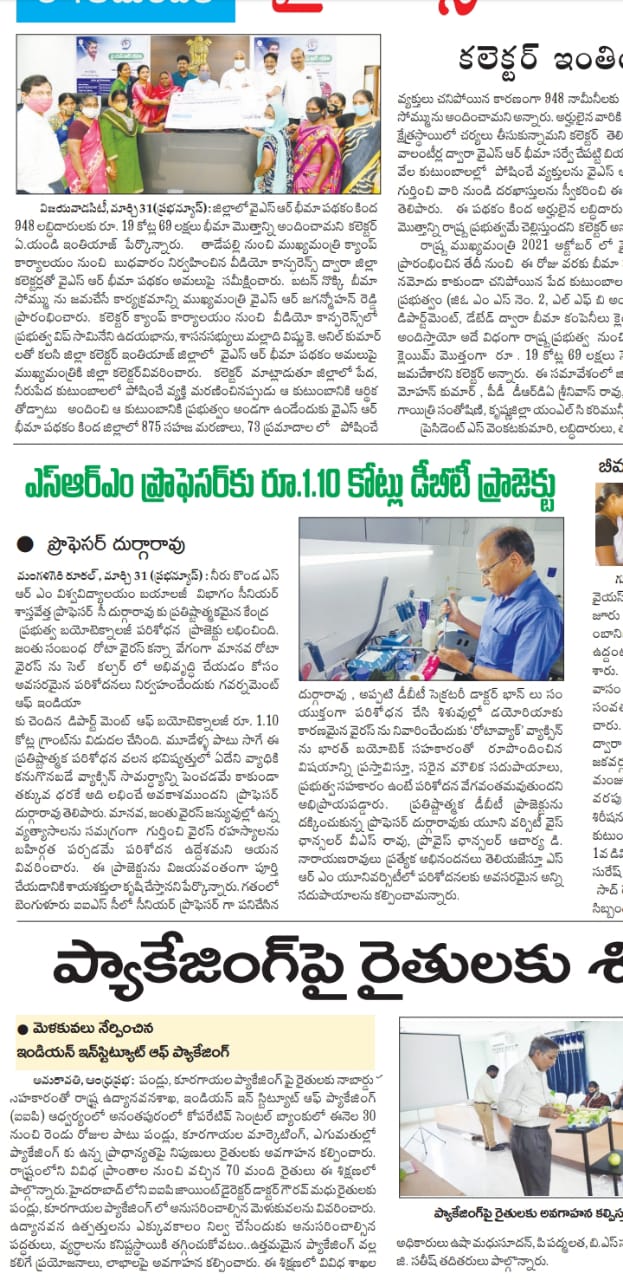
Sakshi – March 31
Continue reading →

- “GETTING GOAL DIRECTED”-Captivating session by Aayushi Sharma April 3, 2021
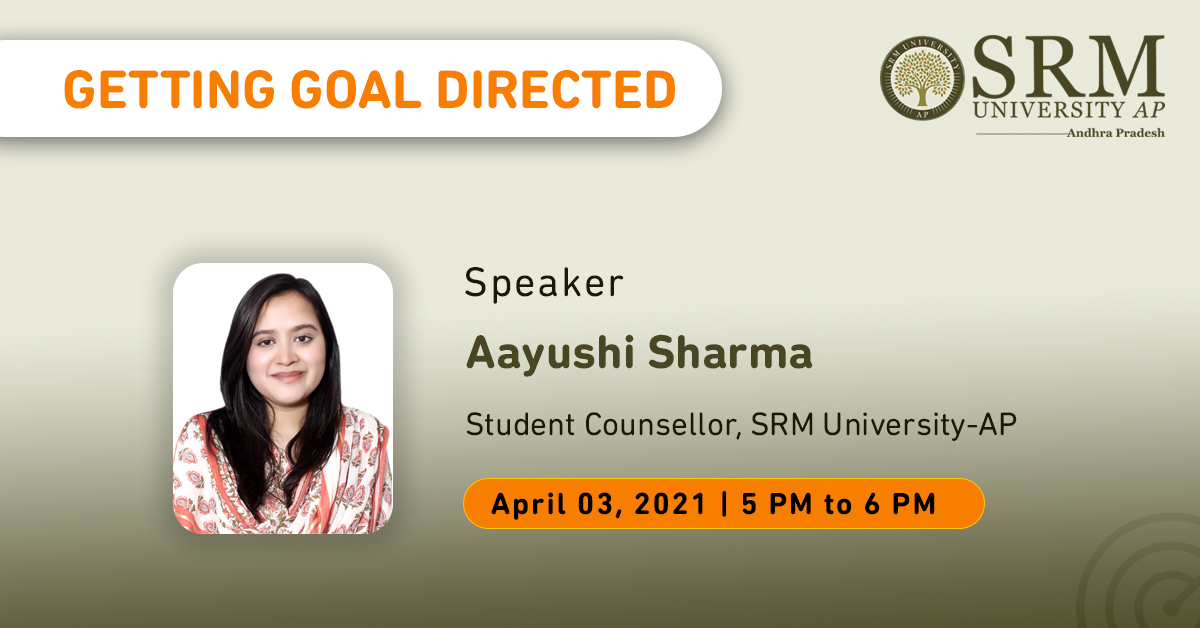 A worthy life is full of admirable goals with a fool-proof plan to achieve those. Be it completing the syllabus, getting a good job, living a peaceful life or retiring with enough money to live; all can be achieved with good planning only. In his celebrated book “Thinking Fast and Slow”, the noble laureate Daniel Kahneman opined, “Intelligence is not only the ability to reason; it is also the ability to find relevant material in memory and to deploy attention when needed.”
A worthy life is full of admirable goals with a fool-proof plan to achieve those. Be it completing the syllabus, getting a good job, living a peaceful life or retiring with enough money to live; all can be achieved with good planning only. In his celebrated book “Thinking Fast and Slow”, the noble laureate Daniel Kahneman opined, “Intelligence is not only the ability to reason; it is also the ability to find relevant material in memory and to deploy attention when needed.”Therefore, it need not be debated that only planning is not enough. You will need proper ways to execute it. This is where Aayushi Sharma comes into the picture. Ms Sharma is your Student counsellor and the appropriate person who can enlighten you on how to plan and turn those plans into actions. Join the captivating session with Ms Aayushi Sharma on April 03, 2021, at 5 pm to know more.
Continue reading → - Undergrad CSE student bags envious placement offer with a CTC of 20 Lakh LPA April 3, 2021
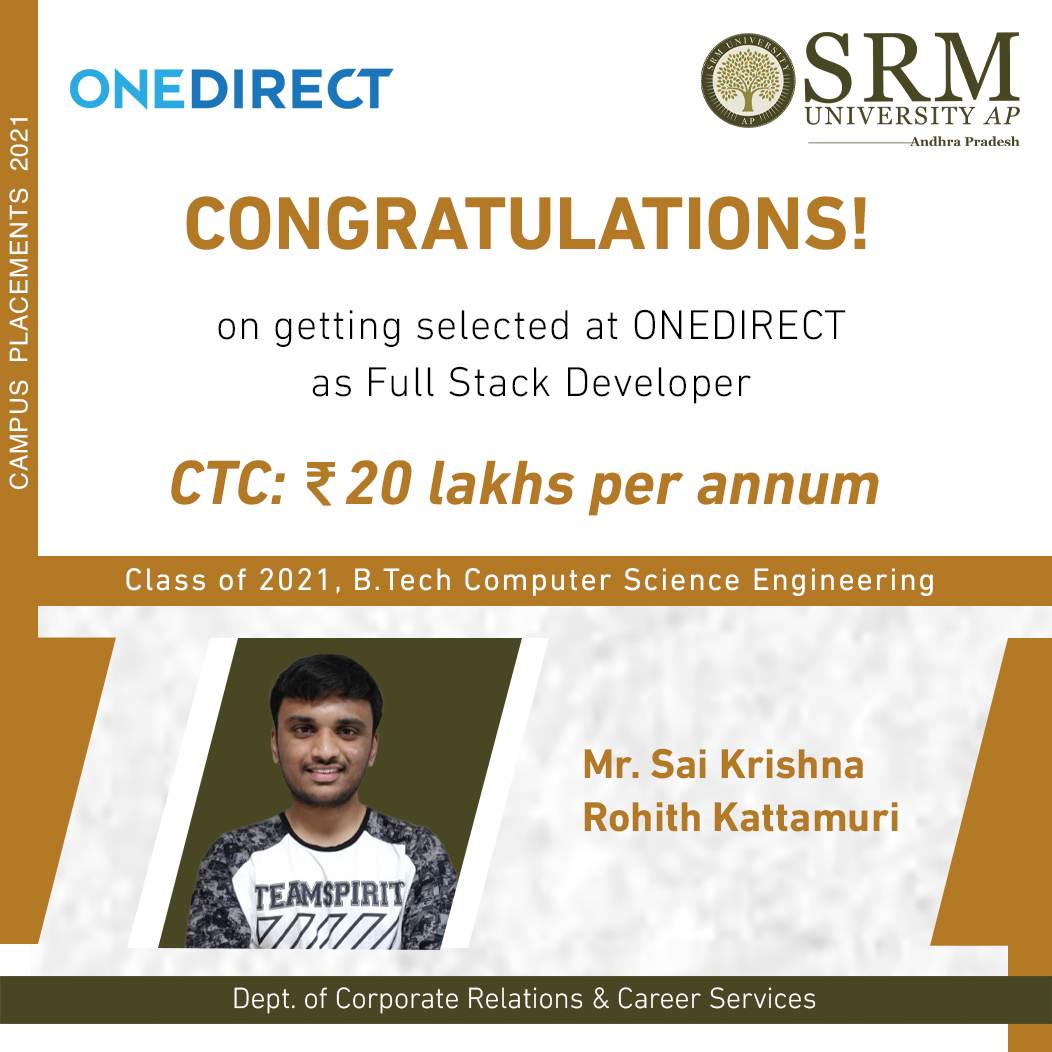 Another proud moment for SRM University-AP when Kattamuri Sai Krishna Rohith bagged an envious job offer from ODCEM Technologies Pvt. Ltd. (OneDirect) with a CTC of 20 Lakhs per annum. He is pursuing his B. Tech final year in the Department of Computer Science and Engineering.
Another proud moment for SRM University-AP when Kattamuri Sai Krishna Rohith bagged an envious job offer from ODCEM Technologies Pvt. Ltd. (OneDirect) with a CTC of 20 Lakhs per annum. He is pursuing his B. Tech final year in the Department of Computer Science and Engineering.Mr Rohith will be joining the company as an intern for six months with monthly compensation of Rs. 20,000. After six months of internship, he will be offered the permanent employee as a Full Stack Developer with a CTC of Rs. 20,00,000 per annum.
Mr Rohith went through rigorous placement training programmes conducted by the Department of Corporate Relations and Career Services to secure the job offer. The job hiring process for this role was conducted in four stages. After preliminary selection, Mr Rohith had to prove his ability in coding, aptitude and other technical domains. The Director of Engineering himself took the final call before offering him a position in the company to see if Rohith is a proper fit for their company.
Rohith expressed his gratitude towards the CR & CS department of SRM University-AP, saying that the training sessions strengthened his core skills and abilities. He was also taught to face interviews and critical questions. Mr Rohith said, “Placement is an arduous process. I was offered another position in other company before, but I was not happy with that offer. I had faith in my abilities, so I continued searching for better opportunities and improve my skill set to secure the Super Dream offer. Keeping nerves in control, not panicking during interviews, excellent communication skills are some essential qualities that everyone should master to get good jobs. I am thankful to the CR & CS department for all their support and customised, personal, need-based assistance, which helped me a lot to prepare for the interviews,” said Mr Rohith.
After five months of determination, Mr Rohith finally secured the job that he was looking for. “The University has provided us with numerous opportunities with a flexible curriculum and Global standards. In addition to all the training, my mentors encouraged me to participate in Hackathons, apply for research internships, and attend conferences. Thanks to the extraordinary faculty that we have, the regular classes were of great help in enhancing my technical knowledge,” asserted Mr Rohith. Mr Rohith was a proud track-winner of Microsoft and EthDenver hackathons and a research Intern at Nanyang Technological University (NTU) Singapore.
He has shared his mantra to success with his fellows. Mr Rohith believes that instead of panicking or comparing with others, one should focus on becoming a better version of oneself, and the success will find him.
Continue reading → - Newsmakers: G Ram Dheeraj to recount the tale of his expedition to “Deo Tibba Peak (6001mts)” April 1, 2021
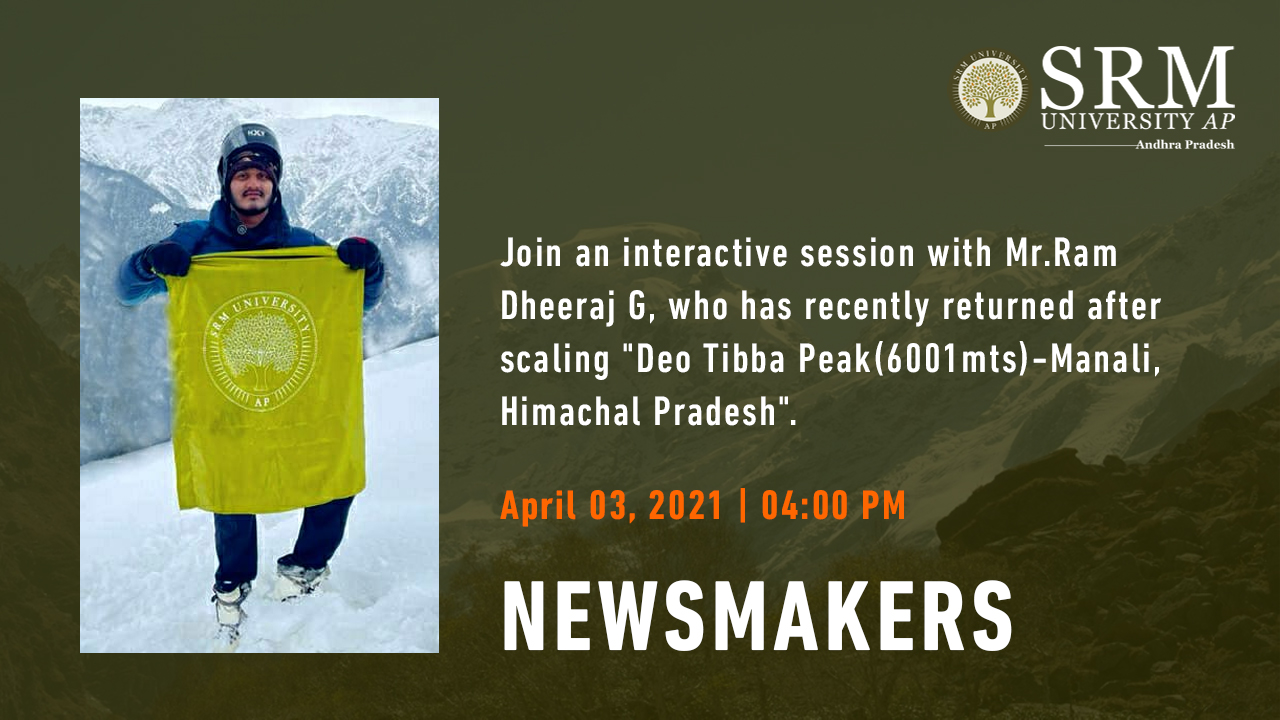 G Ram Dheeraj, 2nd year, Civil Engineering, SRM University-AP, Andhra Pradesh voyaged to the summit of “Shetidhar Peak(5358mts)” and “Friendship Peak (5287mts)” prior to his recent successful trek to the “Deo Tibba Peak (6001mts), Manali, Himachal Pradesh”. DeoTibba is the second highest peak of the PirPanjal Mountains. Basking in the meadows, and glaciers, Dheeraj reached the mountain peak – an exceptional snow dome with a magnificent view.
G Ram Dheeraj, 2nd year, Civil Engineering, SRM University-AP, Andhra Pradesh voyaged to the summit of “Shetidhar Peak(5358mts)” and “Friendship Peak (5287mts)” prior to his recent successful trek to the “Deo Tibba Peak (6001mts), Manali, Himachal Pradesh”. DeoTibba is the second highest peak of the PirPanjal Mountains. Basking in the meadows, and glaciers, Dheeraj reached the mountain peak – an exceptional snow dome with a magnificent view. A trek enthusiast, Dheeraj fancied adventure, mountaineering, seeing places, and embracing the serenity of nature. Bending barriers, he climbed the peak only to marvel at the picturesque view. He rejoiced being at a place traversed by a few. On April 3, 2021, at 4 PM, Department of Student Affairs, SRM University-AP invited Dheeraj to recount the thrilling tales of his expeditions. In the interactive session – “Newsmakers”, he will also share insights on his fitness regime, along with giving the audience a glimpse of his future trekking plans.
Continue reading → - Dr M Mahesh Kumar April 1, 2021


